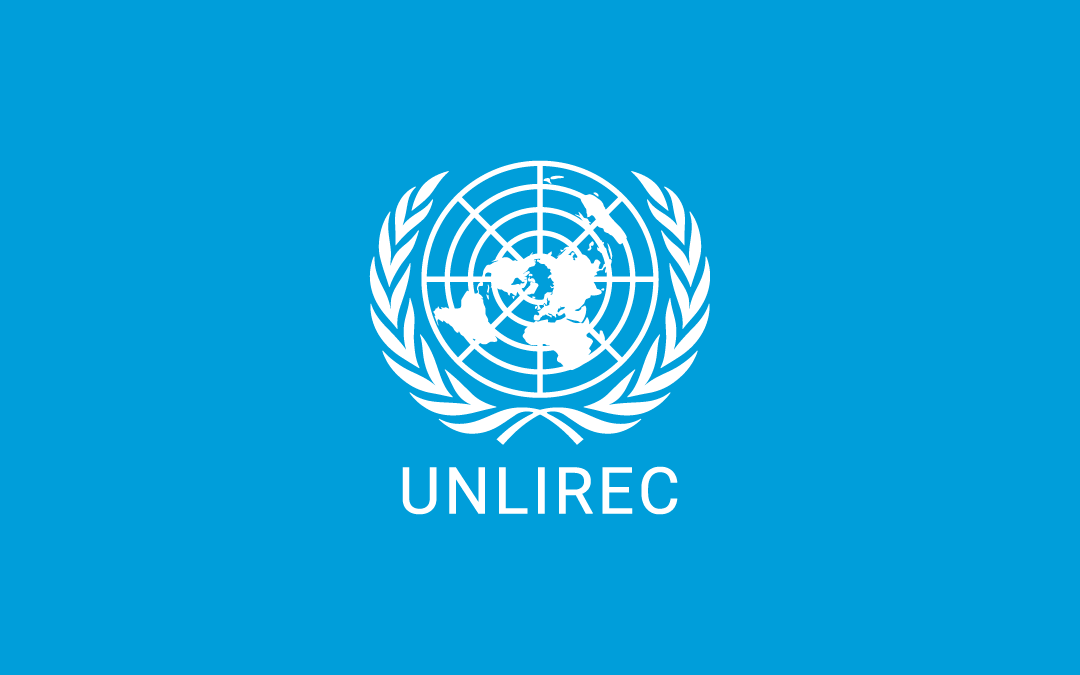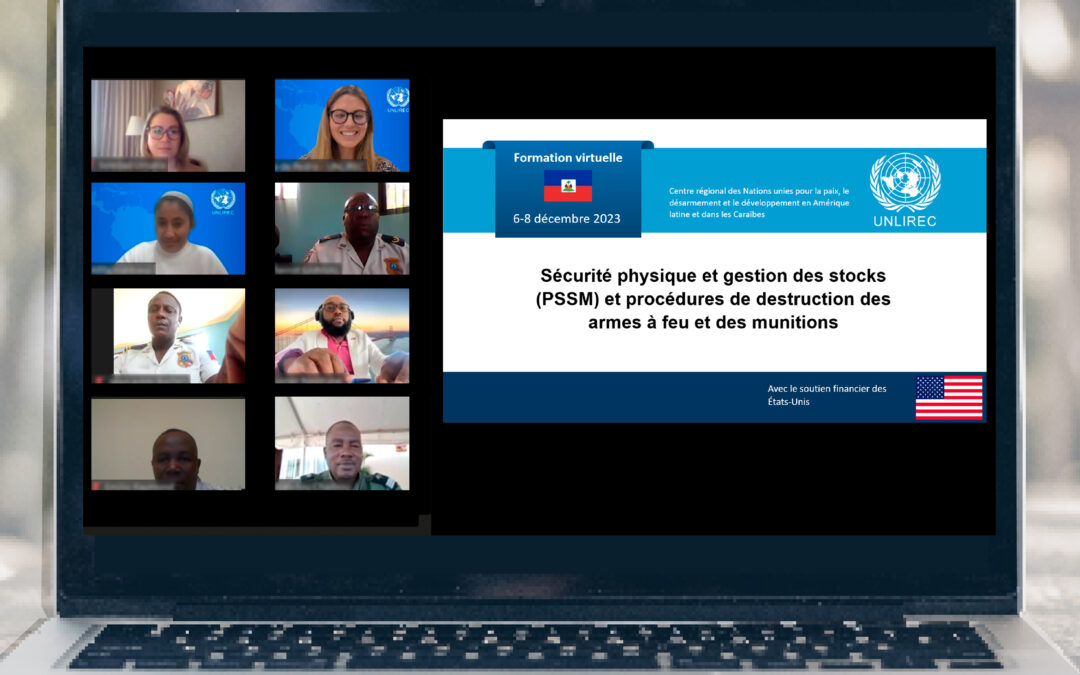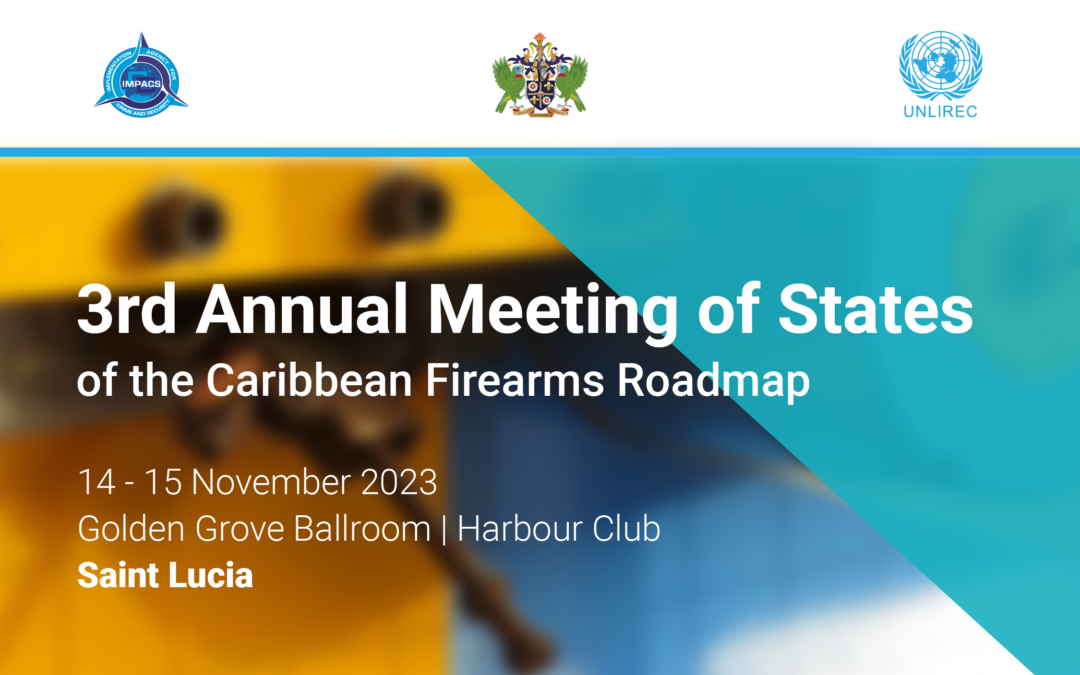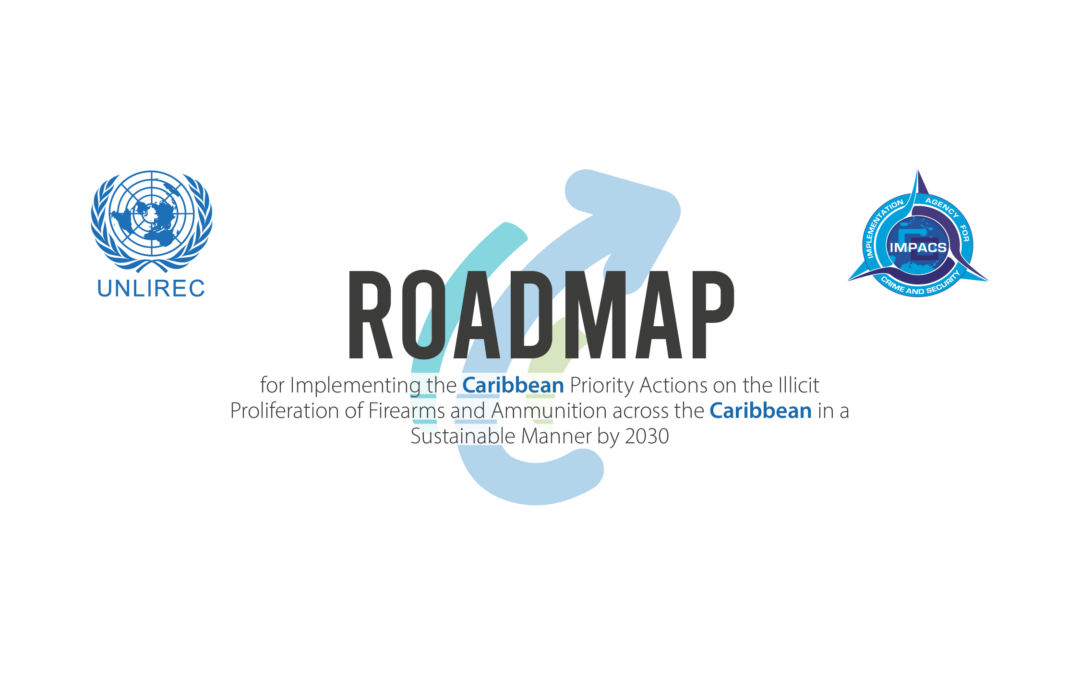
Dec 13, 2023 | Conventional Arms Programme
Between 12 and 13 December 2023, the United Nations Regional Centre for Peace, Disarmament and Development in Latin America and the Caribbean (UNLIREC) conducted a technical assessment of two Haitian National Police armouries in Port-au-Prince.
Reinforcing the physical security and stockpile management of its national stocks is one of the priorities identified by Haiti in its National Action Plan adopted in the framework of the Caribbean Firearms Roadmap, and UNLIREC is supporting the country in these efforts.
The overarching goal of this initiative is to enhance the physical security and stockpile management practices within Haiti, by reducing the risk of accidents and of diversion of firearms, ammunition and explosives from government stockpiles into illicit markets.
During the assessment, UNLIREC’s technical expert reviewed weapons and ammunition management practices and provided recommendations for the Haitian National Police , in accordance with international guidelines approved by the United Nations, such as the Modular Implementation Compendium for Arms Control (MOSAIC) and the International Technical Guidelines on Ammunition (IATG). The assessment was organised in close coordination with the UN Integrated Office in Haiti (BINUH), and a UNPOL officer specialised in weapons and ammunition management in Haiti also took part in the assessment.
In addition to the technical visits, UNLIREC also met with government representatives to present preliminary findings from the visit and to coordinate future activities in line with the Caribbean Firearms Roadmap and Haiti’s National Action Plan to reduce illicit firearms trafficking.
As the regional centre of the UN Office for Disarmament Affairs (UNODA) in Latin America and the Caribbean, UNLIREC remains steadfast in its mission to promote practical disarmament in this region. This initiative reflects the centre’s dedication to supporting Member States in the effective implementation of international disarmament and non-proliferation instruments, in particular the 2001 UN Programme of Action to Prevent, Combat and Eradicate the Illicit Trade in Small Arms and Light Weapons.
This assistance was made possible with the generous financial support of the government of the United States of America.

Dec 8, 2023 | Conventional Arms Programme
From 6 to 8 December, thirty-five (35) Haitian National Police officers bolstered their capacities and knowledge on physical security and stockpile management (PSSM) through virtual training organized by the United Nations Regional Centre for Peace, Disarmament and Development in Latin America and the Caribbean (UNLIREC). Police officers tasked with arms control from various departments, including Artibonite, Grand Anse, North-East, North-West, North, Centre, Nippes, South and South-East, along with specialized units including the Intervention and Maintenance Corps, Motorized Intervention Brigade and Research and Intervention Brigade, gathered for this training.
The main goal of the training was to enhance the Haitian National Police’s capabilities in managing and securing stockpiles of weapons, ammunition, and explosives in accordance with international norms and standards, through theoretical lectures, practical exercises, and group discussions covering crucial aspects of PSSM.
Key topics included International Standards and Best Practices in Stockpile Management, incorporating the Modular Small-Arms-Control Implementation Compendium (MOSAIC) and International Ammunition Technical Guidelines (IATGs). The sessions also delved into standard operating procedures and security plans, marking and recordkeeping, inventory management, and firearms and ammunition destruction procedures.
This initiative aligns with Haiti’s priorities within the Caribbean Firearms Roadmap, specifically under Goal 4, which aims to systematically decrease the risk of diversion of firearms and ammunition from government- and non-government-owned arsenals. Effectively managing weapons and ammunition stockpiles not only mitigates the risk of loss and theft but also prevents accidents, helps to identify obsolete or surplus weapons, and, in turn, contributes to overall peace and security.
The training forms part of the technical assistance provided by UNLIREC in the framework of its project “Preventing Diversion of Conventional Arms and Ammunition in the Caribbean”, funded by the Office of Weapons Removal and Abatement in the United States.

Nov 13, 2023 | Conventional Arms Programme
Saint Lucia. From 14 to 15 November 2023, officials from the Caribbean Community (CARICOM) and the Dominican Republic will gather in Saint Lucia for the 3rd Annual Meeting of States of the Caribbean Firearms Roadmap.
The meeting, organized by the CARICOM Implementation Agency for Crime and Security (IMPACS) and the United Nations Regional Centre for Peace, Disarmament and Development in Latin America and the Caribbean (UNLIREC) in collaboration with the government of Saint Lucia, will bring together national officials as well as Ministers of Security and other high level representatives from the Caribbean region and the international community to discuss ongoing efforts to combat the illicit proliferation and misuse of firearms and ammunition.
The trafficking and misuse of illicit firearms and ammunition continue to result in high homicide and crime rates in many Caribbean States, negatively impacting human and public security. They also greatly affect socioeconomic development across the region, including the public health implications of gun deaths and injuries and the impact of crime on business development and investment. To address those challenges, in 2020, all fifteen (15) CARICOM States and the Dominican Republic adopted the Caribbean Firearms Roadmap, formally known as ‘Roadmap for Implementing The Caribbean Priority Actions on the Illicit Proliferation of Firearms and Ammunition across the Caribbean in a Sustainable Manner by 2030’, with the vision of creating a safer Caribbean region. Since then, the Roadmap has served as a guiding document to achieve the commonly agreed goals and actions, which include strengthening regulatory frameworks on firearms and ammunition; reducing the illicit flow of firearms into, within and beyond the region, and strengthening law enforcement capacity to combat illicit firearms trafficking. To achieve these goals, States are developing National Action Plans (NAPs), which set out States’ national priorities and timelines.
For the past years, States, together with partners and donors from the international community, have gathered in virtual format to discuss the Roadmap’s implementation. This year for the first time they will meet in-person over two days to take stock and renew their commitment to the full and effective implementation of the Roadmap’s goals.
The first day of the meeting on 14 November is dedicated to the Roadmap’s operational aspects, including the importance of evidence-based policy making based on data collection efforts and a robust monitoring and evaluation framework. Participants will also share best practices and lessons learned from national flagship initiatives to address armed violence across the region. Various other stakeholders, including the co-custodians of the Roadmap, CARICOM IMPACS and UNLIREC, as well as implementing partners such as the Organization of American States (OAS), International Criminal Police Organization (INTERPOL), the United Nations Development Programme (UNDP), the United Nations Office on Drugs and Crime (UNODC), the Small Arms Survey (SAS) and the World Customs Organization (WCO) will also make interventions.
Ministers and officials from CARICOM States, the Dominican Republic and the international community gather in a high-level plenary on day two of the Conference, with a view to taking stock of the significant progress and important achievements made under the Roadmap to date, while examining ways to achieve further progress to overcome existing implementing gaps in order to further strengthen the security of the Caribbean region and its communities. Expected to participate is Izumi Nakamitsu, United Nations Under-Secretary-General and High Representative for Disarmament Affairs, as well as Ministers from several CARICOM States. It is anticipated that the meeting will conclude with the adoption of a joint statement.
The meeting is funded with the generous support of the Government of Canada.
Media representatives cannot be accommodated to attend the meeting. For further information on the press encounter, the Roadmap, and the Annual Meeting of States, please visit www.unlirec.org or contact Melissa Yi, Communications Officer, UNLIREC, at melissa.yi@unlirec.org.

Oct 27, 2023 | Conventional Arms Programme
October 2023. The CARICOM Implementation Agency for Crime and Security (IMPACS) and the United Nations Regional Centre for Peace, Disarmament and Development in Latin America and the Caribbean (UNLIREC), as the co-custodians of the Caribbean Firearms Roadmap, welcome Mines Advisory Group (MAG) as a new implementing partner.
MAG is a global humanitarian and advocacy organization that finds, removes and destroys landmines, cluster munitions and unexploded bombs from places affected by conflict. The organization, which employs some 6,000 people in over 30 countries, also delivers work to reduce armed violence by educating people about the risks of small arms and light weapons and by destroying and marking weapons and helping authorities to safely store arms and ammunition. Since 1989, MAG has helped over 20 million people in 70 countries rebuild their lives after war. In 1997, MAG shared the Nobel Peace Prize for its role in banning landmines.
With the addition of MAG, there are now seven Roadmap Partner agencies that include the Organization of American States (OAS), International Criminal Police Organization (INTERPOL), UN Development Programme (UNDP), the United Nations Office on Drugs and Crime (UNODC), the Small Arms Survey (SAS) and the World Customs Organization (WCO).
The Caribbean Firearms Roadmap was adopted in July 2020 with a view to making the region safer by addressing the illicit proliferation of firearms and ammunition. International partners have since supported Caribbean States through the provision of expertise and best practices towards the adoption of sustainable solutions, consistent with international norms and the Caribbean context, to control, eradicate, prevent, and prosecute the illicit possession, proliferation and misuse of firearms and ammunition.

Sep 4, 2023 | Conventional Arms Programme
On 4, 7 and 8 September 2023, the United Nations Regional Centre for Peace, Disarmament and Development in Latin America and the Caribbean (UNLIREC) hosted three regional Monitoring, Evaluation & Reporting webinars. These followed a previous webinar held on 27 March 2023, and precede the upcoming Annual Meeting of States of the Caribbean Firearms Roadmap, scheduled for 14-15 November 2023 in Saint Lucia.
Following welcoming remarks from representatives of UNLIREC and CARICOM IMPACS as co-custodians of the Caribbean Firearms Roadmap, the webinars highlighted the commitment by the Caribbean Firearms Roadmap States to combat illicit trafficking, forge partnerships and strengthen regional capacities. . Participants were updated on progress and developments to date in order to provide participants a comprehensive overview of ongoing efforts in the region. In addition, Filoi, who developed the Roadmap Reporting Platform. provided a hands-on demonstration of its functionality, ensuring that attendees gained practical insights into its effective use.
The primary focus of this webinar was to enhance understanding of the Roadmap Reporting Platform and engage relevant Caribbean Firearms Roadmap Focal Points.
Towards the Annual Meeting of States
This November, the Annual Meeting of States of the Caribbean Firearms Roadmap will bring together Ministers from the region to discuss implementation of said Roadmap, identify additional priorities, challenges and assistance needs. In that regard, the work of National Focal Points towards monitoring and evaluation is crucial to the success of the Annual Meeting.
These M&E webinars are aligned with the UN Programme of Action on Small Arms and 2030 Agenda for Sustainable Development, in particular Goal 16 “Peace, justice and strong institutions”, and were made possible with funding from the Government of Germany.
Learn more about the Caribbean Firearms Roadmap here.





